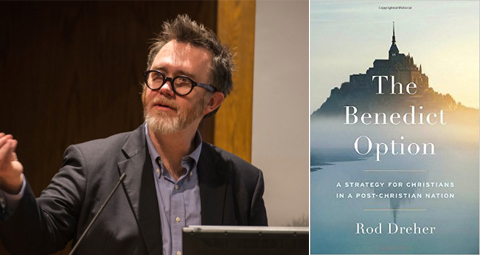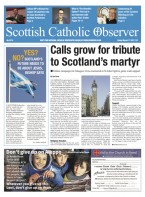March 17 | ![]() 0 COMMENTS
0 COMMENTS ![]() print
print

Could the Benedict option work in Scotland?
In a radical new vision for the future of Christianity, Rod Dreher calls on Christians to prepare for the coming Dark Age by embracing an ancient monastic way of life. IAN DUNN talks to the controversial American author
ROD Dreher’s The Benedict Option is already one of the most discussed books in America—and it only came out last week.The journalist and author’s prescription for Christians living in a post-Christian world has sparked a fierce reaction, with negative and positive reviews spiralling across the internet.
In essence the book calls for Christians to look to the rule of St Benedict to inspire them in building communities of Faith that survive in a society that is at best indifferent and at worst hostile to their Faith. As the Benedictine monks kept the flame of the Faith in their monasteries alive all through the Dark Ages, he argues, so are we called to do the same in our era.
“People assume I’m saying run for the mountains and build a bunker and await the end—it’s not that at all,” he tells me from his home in Baton Rouge, Louisiana.
“I’m calling for Christians to create spaces of real Christian contemplation, so we have the strength to go out into the world and be who Christ asked us to be.
“If we are not aware of ourselves as different from the world, and don’t do things to strengthen our Christian identity, we will be absorbed into it. I think that has happened to the Church in my country.”
European Christianity often looks to America, envious of the faith there, but Mr Dreher is adamant they also have a post-Christian culture, even if we are further down the road.
“I’ve spent most of my professional life working in secular journalism and even when people were friendly to me they thought I was an exception, a Christian they could talk to,” he recalls.
“They had no other Christian friends so it was easy for them to believe the absolute worst about Christians.
“When I talk to Christians in academia in the US many of them are living undercover in their universities, terrified of what would happen if their colleagues knew they were Christians.”
He points out that the young people being shaped by these secular universities ‘are going to be the next elites in American society and often they don’t even know what they don’t know about Christianity because it’s ceased to be a living thing in their lives and it’s ceased to be alive in their universities.’
“We are in a very dangerous time,” he suggests, “because while many people of influence may be indifferent to Christianity, those who are hostile to it have the high ground and they have the initiative.
“I worry about Christians in American who voted for Trump over Clinton because she was bad on religious liberty, which she was. But the simple fact we’ve elected a Republican does nothing to turn back these decades of secularisation. Trump could be a saint of God and he could still not stop these cultural currents.
“We’re living in a post-Christian time. God has called us to be faithful in this time so we need to think very hard about how we can survive and indeed thrive.”
To that end much of The Benedict Option is intensely practical and looks at ways Christians can build up communities that strengthen their Faith.
Constantly taking inspiration from the life of the Benedictine Monks of Norcia, and their ancient way of life, has lessons for us today. Even down to things as simple as staying at Church after Mass for a coffee to build community.
“Someone said ‘the Benedict Option’ is only the Church being the Church, but if you say that people won’t do it!” he laughs.
“Which is really right. We should have been doing these things all along, but we fell into spirituality laziness.”
The book also warns Christians to be very careful with the use of technology and social media, which is changing our lives in ways we may not be aware of.
“This morning I was sitting there with a book I’m enjoying very much waiting for my tyres to get changed and I couldn’t get through three pages without reaching for my phone to check my emails, check Twitter,” he said.
“This is a real problem—all of us are losing the ability to concentrate. There’s a man, Tim Woo, who written a book about secular advertising. He brings out the monks as having great wisdom about the importance of controlling time and attention and making sure you’re paying attention to the right things.
“This could be the most radical thing about ‘the Benedict Option’ if people take it seriously: how we regain control of our time and not be ruled by our impulses to check the smartphone.
“People who can do that are at an incredible advantage because you’re in control of yourself.”
To that end he suggests that Christians embrace the digital fast.
“Putting the smartphone down for a day, turning the computer off for longer,” he said. “That for me is harder than doing without food. I think most modern people might find that.”
However he also calls for a revival of traditional fasting. “It’s practical. Talk to your priest about it,” he suggests. “The point is not to avoid food but to rightly order the flesh to the spirit.”
When he talks about ‘the Benedict Option,’ he is happy to admit the concept can be a little undefined.
“There will many Benedict Options as Christians around the West figure out how to adapt this to local circumstances and their own traditions.
“But what unites us is a realisation that we must return to the deep roots of the Christian Faith and embody this not only in our thought and study but in our practices.
You have to give your hearts to Christ. The Benedictine Monks have been doing this for 1,500 years. They’ve got it down. And there are things we in the laity can learn from them.”
Mr Dreher visited the Benedictine Monks in Norcia, Italy, several times in researching the book, and their monastery, founded originally by St Benedict, had a profound effect on him.
“I remember the first time I sat down to interview Fr Casian, the prior at the monastery,” he said. “I felt this overwhelming sense of serenity coming from him. This is a man who thinks deeply, who prays deeply and conveys a strong sense of authority. It was like talking to my father and that’s what a priest and a monk should be, a spiritual father.
“And I felt that multiplied with other monks I spoke to there who were under his authority. That’s when I felt there was something special about this particular monastery.”
After he visited, tragedy was to strike the monks and their historic home, when a series of earthquakes hit central Italy, the final one destroying the ancient Basilica of St Benedict.
“The most serious one happened on a Sunday morning and I stood in my own Church here in Louisiana praying for those monks and trying not to cry because I love them as my brothers in Christ and I really believe God has established that monastery to be a light to the world,” he said.
“And when I heard from them I really believed God would use them in an even more powerful way than I anticipated, and the monks understand that too.
“It’s quoted in the book, one of them saying: ‘We look at the ruins of the basilica as a symbol of the Church today in the West that we have to rebuild.’
Mr Dreher points out that it is ‘extraordinary’ the monks are alive for the rebuilding because they moved just outside the city to a safe space when the first quakes hit. “They did not abandon the city; they were still there to serve the people of the town, and because they’d been living by the rule of St Benedict for so long they carried within them the monastery, so it was not so difficult to re-establish it,” he said. “I find the whole thing to be a remarkable example for all of us Christians in the West.
“It’s such a tragedy, but as we known from our Faith, new life comes out of death and I think extraordinary new life will rise out of Norcia and they will be a brighter light to the world than they would have been otherwise.”
“The monks already had to maintain through the worst periods in the history of the Church and they did it through regular prayer and ordered living.”
That, to Mr Dreher, is the template.
“It’s not much of a slogan to attract people, but we Christians in the West are going to have to learn to suffer well and suffer with joy. And if we unite our suffering with God it’s going to have meaning and lead to the redemption of the world.”











